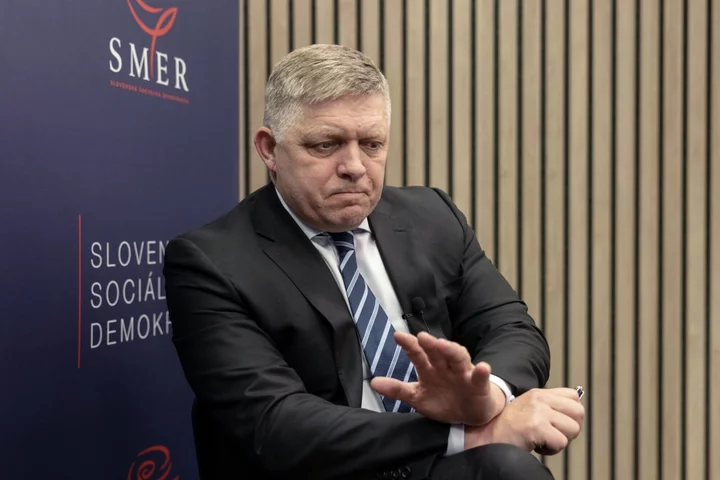A former Slovak premier who derides the European Union’s sanctions against Russia and military aid to Ukraine appeared on track to win the country’s election, presenting a fresh risk to EU unity.
With 85% of voting districts reporting, Robert Fico’s Smer party had 23.7% of the vote in the contest on Saturday, while his main rival Progressive Slovakia, secured 15.3%, according to the Statistics Office.
The most dominant political figure in the eastern European nation of 5.4 million since the fall of communism, Fico is seeking a fourth term in office with a pledge to voters to boost social spending and challenge EU policy on issues ranging from migration to security to climate. He resigned in 2018 after a burst of public outrage following the killing of an investigative reporter who probed corruption in Slovakia.
Fico’s victory adds to the tide of nationalist and populist forces in Europe, which have gained traction by tapping electorates’ frustration over the pandemic, the region’s cost-of-living crisis and fatigue over the war in Ukraine.
Although he was the frontrunner for months, the former premier confronted a challenge at the end of the campaign from Progressive Slovakia, which aimed to preserve the country’s trans-Atlantic orientation and democratic institutions.
Fico will still need to find partners for a ruling coalition. No party came close to a majority in parliament, where at least seven parties were on track to overcome the threshold to enter the 150-seat assembly. The nation’s fragmented political landscape has made coalition-building an uphill battle.
An ally of Hungarian Prime Minister Viktor Orban, Fico, 59, has tapped into anxiety in an electorate that is among the most pro-Russian in the 27-member bloc. He was abetted by a social media campaign that included several false claims, making the election a test case for new EU legislation that aims to staunch the spread of illegal or harmful online content.
Slovakia has a track record of political tumult and fractious coalitions, with nine governments since it entered the EU in 2004. Party infighting helped bring down the cabinet of Prime Minister Eduard Heger late last year, an alliance that was elected in 2020 to tackle corruption.
A new government will have to grapple with a widening budget deficit in Slovakia’s $115 billion economy. The euro-area member will need to secure as much as €10 billion ($10.6) from financial markets next year.
Once a Social Democratic reformer, Fico has embraced a populist wave that’s swept Europe — denouncing asylum seekers, opposing Ukraine’s NATO aspirations and deriding Slovakia’s reformist president, Zuzana Caputova, as an “American agent.”

